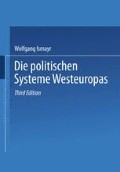Zusammenfassung
Nachdem das Großherzogtum Luxemburg mit Wirkung des Londoner Vertrags vom 19.5.1839 ein unabhängiger Staat geworden war, erhielt das Land 1841 seine erste Verfassung, die deutlich durch das belgische Vorbild geprägt war. Erst die Verfassung vom 17.10.1868 eröffnete den Wandel zu einer parlamentarischen Monarchie, denn die vorausgegangene liberale Reform von 1848 war durch die vom Deutschen Bund aufgezwungene Verfassung 1856 revidiert worden.
Access this chapter
Tax calculation will be finalised at checkout
Purchases are for personal use only
Preview
Unable to display preview. Download preview PDF.
Literaturverzeichnis
ADR, 1994: Aktionskomitee für Demokratie und Rentengerechtigkeit — 20 Reformpunkte für unser Land, Luxemburg.
Biltgen, Francois, 1993–1996: Interviews des Autors mit dem ehemaligen Fraktionssekretär der CSV (bis 1994), zur Zeit Arbeitsminister und Minister für Parlamentsbeziehungen, vom 12.5.1993, 28.10.1993, 7.11.1994, 10.2.1995 und 22. 1. 1996.
Braz, Felix, 1995: Interview des Autors mit dem Fraktionssekretär der Grünen vom 13. 3. 1995.
CRISP (Centre de Recherche et d’Information Socio-Politiques, Systémes et comportements électoreaux), 1987:. Analyse et synthèse des scrutins de 1974, 1979, 1984, Brüssel.
CRISP (Centre de Recherche et d’Information Socio-Politiques, Systémes et comportements électoreaux), 1989: Les Elections au Grand-Duché de Luxembourg, Brüssel.
CSV, 1974: Grundsatz-und Aktionsprogramm, Luxemburg.
CSV, 1986: Bericht zur Journée Parlementaire, am 11.10.1986, unveröffentlichtes Typoskript der CSVFraktion.
CSV, 1989: E Programm fir Iech ( CSV-Wahlprogramm 1989 ), Luxemburg.
DP, 1979: Léiwer DP, Wahlprogramm 1979, Luxemburg.
Dumont, Patrick/De Winter, Lieven 1997: Luxemburg: Stabile Koalitionen in einem Parteiensystem mit einer pivotalen Partei, in: Müller, Wolfgang C./Strom, Kaare (Hrsg.), Koalitionsregierungen in Westeuropa, Wien, S. 501–546.
Fusilier, Raymond, 1960: Les Monarchies Parlementaires, Paris.
Hammes, Léon, 1957: Le Conseil d’Etat du Grand-Duché de Luxembourg, Luxemburg.
Hearl, Derek, J., 1992: Party and Coalition in Luxembourg, in: Laver, Michael/Budge, Ian (Hrsg.): Party Policy and Government Coalitions, New York, S. 223–243.
Hirsch, Mario, 1974: Die Logik der Integration. Überlegungen zu den Außenbeziehungen westeuropäischer Kleinstaaten, in: Europa-Archiv 29, S. 447–456.
Hirsch, Mario, 1976: Influence without Power. Small States in European Politics, in: The World Today 3, S. 112–118.
Hirsch, Mario, 1983: Who is in Charge of the Destinies of the Small States? The Case of Luxemburg, in: Höll, Otmar (Hrsg.), Small States in Europe and Dependence, Wien, S. 130–139.
KPL, 1981: Eenegkeet fir Fridden, Demokratie, soziale Fortschrett, Luxemburg.
Lorenz, Pierre-Louis 1983: Luxemburg: The Upgrading of Foreign Policy, in: Hill, Christopher (Hrsg.), National Foreign Policies and European Cooperation, London, S. 153–165.
LSAP, 1979: Programm 1979, Luxemburg.
Majerus, Pierre, 1968: Les Institutions de L’Etat Luxembourgeois, Luxemburg.
Mehlen, Robert, 1995: Interview des Autors mit dem Vorsitzenden des ADR und des Neutralen Bauernverbands (NBV) vom 6. 3. 1995.
Mischo, Jean, 1984: Interview des Autors mit dem damaligen Verwaltungsdirektor im Außenministerium von Luxemburg vom 23. 8. 1984.
Nohlen, Dieter, 1969: Luxemburg, in: Stemberger, Dolf/Vogel, Bernhard (Hrsg.), Die Wahl der Parlamente und anderer Staatsorgane, Bd. I, 1. Halbbd., Berlin, S. 809–831.
Schaeffer, Nico, 1960: Les Forces Politiques au Grand-Duché de Luxembourg 1919–1960, Paris (unveröffentlicht).
Schaus, Emil, 1974: Ursprung und Leistung einer Partei. Rechtspartei und Christlich-Soziale Volkspartei 1914–1974, Luxemburg.
Schroen, Michael, 1986: Das Großherzogtum Luxemburg. Portrait einer kleinen Demokratie, Bochum. Schroen, Michael, 1987: Luxemburg und die Stunde Null in San Francisco. Erinnerungen an die Gründung der Vereinten Nationen, in: Luxemburger Wort, 9. 1. 1987.
Schroen, Michael, 2000: Die Christlich-Soziale Volkspartei Luxemburgs (CSV), in: Veen, Hans-Joachim(Hrsg.), Christlich-demokratische und konservative Parteien in Westeuropa 5, Paderborn, S. 335–404.
Schroen, Michael, 2001: Luxemburg. Interessenvermittlung in einem Kleinstaat, in: Reutter, Werner/Rüt- ters, Peter (Hrsg.), Verbände und Verbandssysteme in Westeuropa, Opladen, S. 241–262.
Socialistes Européens, 1983: Wirtschaftspolitische Perspektiven der LSAP (Cahiers 2), Luxemburg.
STATEC (Service Central de la Statistique et des Etudes Economiques), 1989: Bulletin du STATEC 7/1989, Luxemburg.
STATEC (Service Central de la Statistique et des Etudes Economiques), 1994: Bulletin du STATEC 7/1994: Luxemburg.
Theis, Fons, 1974: Luxemburg: Konstitutionelle Monarchie von demokratischem Charakter, in: Schöndube, Claus (Hrsg.), Die Parlamente der neun EG-Staaten, Bonn, S. 63–68.
Thill, Jean, 1978: Documents et Textes Relatifs aux Constitutions et Institutions Politiques Luxembourgeoises, Luxemburg.
Trausch, Gilbert, 1981: Le Luxembourg à l’Epoque Contemporaine, Luxemburg.
Väyrynen, Raimo, 1974: The Position of Small Powers in the West European Network of Economic Relations, in: European Journal of Political Research, S. 143–178.
Weil, Gordon L., 1970: The Benelux Nations. The Politics of Small-Country Democracies, Santa Barbara.
Woyke, Wichard, 1984: Das „Zwischenland“: Zur politischen Kultur Luxemburgs, in: Reichel, Peter (Hrsg.), Politische Kultur in Westeuropa, Bonn, S. 261–269.
Woyke, Wichard, 1985: Erfolg durch Integration. Die Europapolitik der Benelux-Staaten von 1947 bis 1969, Bochum.
Editor information
Editors and Affiliations
Rights and permissions
Copyright information
© 2004 VS Verlag für Sozialwissenschaften | GWV Fachverlage GmbH, Wiesbaden
About this chapter
Cite this chapter
Schroen, M. (2004). Das politische System Luxemburgs. In: Ismayr, W. (eds) Die politischen Systeme Westeuropas. Uni-Taschenbücher. VS Verlag für Sozialwissenschaften, Wiesbaden. https://doi.org/10.1007/978-3-322-97575-1_12
Download citation
DOI: https://doi.org/10.1007/978-3-322-97575-1_12
Publisher Name: VS Verlag für Sozialwissenschaften, Wiesbaden
Print ISBN: 978-3-322-97576-8
Online ISBN: 978-3-322-97575-1
eBook Packages: Springer Book Archive

